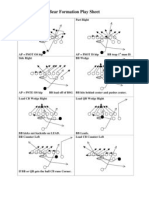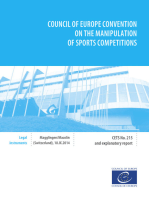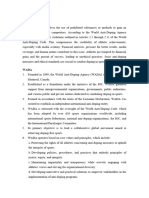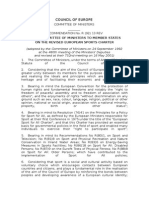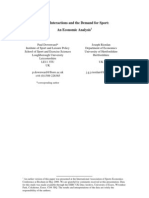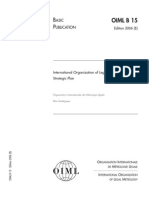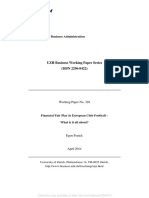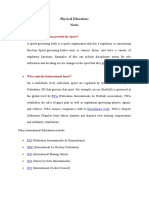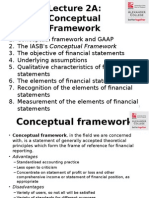MSL 1304 Rev 3 Backgroundpaperoncorruption
MSL 1304 Rev 3 Backgroundpaperoncorruption
Uploaded by
Vassos KoutsioundasCopyright:
Available Formats
MSL 1304 Rev 3 Backgroundpaperoncorruption
MSL 1304 Rev 3 Backgroundpaperoncorruption
Uploaded by
Vassos KoutsioundasOriginal Description:
Original Title
Copyright
Available Formats
Share this document
Did you find this document useful?
Is this content inappropriate?
Copyright:
Available Formats
MSL 1304 Rev 3 Backgroundpaperoncorruption
MSL 1304 Rev 3 Backgroundpaperoncorruption
Uploaded by
Vassos KoutsioundasCopyright:
Available Formats
Council of Europe and Sport
S
MSL13 (2014) 4rev3
Strasbourg, 24 July 2014
13th Council of Europe
Conference of Ministers
responsible for Sport
Macolin/Magglingen, Switzerland
18 September 2014
Introductory paper on theme I: Risk of corruption in the
governance of sport
prepared by
MSL13 (2014) 4rev3
Synopsis
As a very competitive activity and even a multi-million euro business, sport can be subject to corruption. The
continuing scandals reinforce this. While the implementation of good governance principles is key, sports
organisations, as well as governments which support them financially, need to follow a zero tolerance
policy as outlined herein.
I.
Introduction
As a value-oriented organisation, the Council of Europe has stressed for decades that sport pre-supposes
effort, commitment, personal empowerment, respect for opponents and rules, joy, solidarity and team spirit,
among other things. Far beyond the visible activity itself, sport provides role modelling and a means of
conveying these values to members of society, and to the youth in particular. In addition to its educational
role, sport contributes to public health, social inclusion and is an increasingly important economic activity.
Sport organisations which enjoy the right to freedom of association, are expected to provide numerous social
benefits, in an autonomous way but with the support of states and within the framework of the applicable law.
The two key Recommendations of the Committee of Ministers to member states on the revised Code of
Sports Ethics (Recommendation CM/Rec(2010)9) and on the European Sports Charter (Recommendation
No. R (92) 13 rev) reflect this approach.
However, as in any other sector of society sport is not immune to corruption, on the contrary, as a very
competitive activity it is exposed to specific risks, especially as nowadays parts of it have become a multimillion euro business while the structures are sometimes still those of an amateur club, with limited
accountability requirements. With checks and balances, transparency and accountability lacking, many sport
organisations are struggling with misuse of power and corruption. This is not a singular problem as due to
the high media attention for sport any negative incident becoming public is a scandal which tarnishes the
image of sport and shatters the trust in sports contribution to society.
Good governance in sport is needed to hold up the values inherent to sport and to ensure sport
organisations are taken seriously. The Council of Europe addressed the issue of Good governance in Sport
th
at its 10 Conference of European Ministers responsible for Sport (Budapest, 2004); published a European
survey on it and the Recommendation Rec(2005)8 of the Committee of Ministers to member states on the
principles of good governance in sport.
In 2009, the Enlarged Partial Agreement on Sport (EPAS) decided to keep its focus on the manipulation of
sports competitions, with the more general issue of the fight against corruption in sport to one side, to be
1
addressed at a later stage (see ref. no. 1) .
Since then, allegations and cases of corruption in sport have continued to surface making action more
urgent. On 25 April 2012 the Parliamentary Assembly of the Council of Europe adopted a resolution on
Good governance and ethics in sport (ref. nos. 3 & 13), based on a report mentioning recent scandals and
decisions in the governance of international football. Other international organisations have addressed the
issue of corruption in sport as well. The Declaration of the Fifth UNESCO International Conference of
Ministers and Senior Officials responsible for Physical Education and Sport (MINEPS V, in Berlin) in its
section on Integrity of Sport, addresses corruption in sport on an equal footing with doping and the
manipulation of sports competitions.
Similarly, issues of corruption in sport governance or in the bidding for or preparation of major sports events
have been addressed by national governments and parliaments, e.g. in Switzerland (see for instance ref. no.
9) and the United Kingdom (see for instance ref. no. 11). Considering the European involvement in the
international sports movement, the role of European states hosting events or headquarters of sport
organisations, and the financial involvement of public authorities in sport, the EPAS Governing Board
th
decided in June 2013 to make corruption in the governance of sport the main topic of the 13 Council of
Europe Conference of Ministers responsible for Sport.
II.
Towards better governance in sport
The promotion and enforcement of the good governance principles is considered to be the key to preventing
and addressing the issue of corruption in sport. Moreover, better governance is likely to more efficient, open
and reliable sports organisations. Indeed, the governance of sports organisations needs to be transparent,
Refers to the number in the Bibliography for more information.
MSL13 (2014) 4rev3
accountable and responsive and to allow stakeholders a share in the strategic decision-making process. A
system of checks and balances needs to be installed in all sports organisations to enable trust between all
stakeholders.
The Recommendation Rec(2005)8 on good governance in sport (ref. no. 2), specified effective policies and
measures of good governance in sport, which include as a minimum requirement:
- democratic structures for non-governmental sports organisations based on clear and regular electoral
procedures open to the whole membership;
- organisation and management of a professional standard, with an appropriate code of ethics and
procedures for dealing with conflicts of interest;
- accountability and transparency in decision-making and financial operations, including the open publication
of duly audited yearly financial accounts;
- fairness in dealing with membership, including gender equality and solidarity;
Following the adoption of this recommendation, a number of notable initiatives have backed similar principles
and further elaborated or operationalised them into indicators.
In 2008, the IOC Basic Universal Principles of Good Governance (ref. no. 12), were approved by the XIIIth
Congress, (Copenhagen, 2009) and referred to in the 2011 update of the Olympic Charter. Eventually, the
principles of good governance were enacted in an explicit way in the 2013 update of the Code of Ethics: its
article C1 mentions that The Basic Universal Principles of Good Governance of the Olympic and Sports
Movement, in particular transparency, responsibility and accountability, must be respected by all Olympic
constituents. Moreover, the quite detailed Basic Universal Principles of Good Governance of the Olympic
and Sports Movement were set out as an Implementing Provision of the IOC Code of Ethics. However, so
far, the IOC Code of Ethics is not self-executing in every international federation. Some sports organisations
have adopted the IOC standards and started to review their governance or to consider statutory updates,
whereas others are hesitant, either because they do not agree with IOCs policies or they feel insecure about
what is expected from them.
In parallel, the Council of the European Union, in the framework of the implementation of the Work Plan for
Sport 2011-2014 (Resolution of the Council and of the Representatives of the Governments of the Member
States, meeting within the Council, on a European Union Work Plan for Sport for 2011-2014), set up an
Expert Group on Good governance which adopted a number of deliverables, including Principles for good
governance in sport (ref. no. 8), which set a framework within which sports organisations should operate. In
2011, the European Commission supported a number of projects in the field of good governance in sport,
within the framework of the preparatory actions in the field of sport (e.g. ref. nos. 13 & 4).
The rationale underlying the EU principles is that there is a link between the autonomous self-regulation of
the sports movement, and its compliance with good governance principles. The IOC process was possibly
also influenced by this approach, since the Basic Universal Principles of Good Governance of the Olympic
and Sports Movement were first elaborated in a seminar on the Autonomy of Olympic and Sport Movement,
following the high profile case of MecaMedina and Majcen (C-519/04) in 2006 in which the Court of Justice
of the European Union rejected a sports exception tailored for sports organisations and reinforced the legal
uncertainty of the environment in which they operate (ref. no. 7).
In addition, two recent specific football processes resulted in the improvement of policies and practices
according to good governance principles. Following a number of allegations of corruption and of legislative
interference, leading to the suspension of high level officials, the 2011 FIFA Congress, at the request of the
FIFA President, ordered an independent Review on the Governance of FIFA (ref. no. 14), and
subsequently set-up a temporary Independent Governance Committee (IGC). The IGC proposed a number
of recommendations, some of which were adopted by the 2012 and 2013 Congresses of FIFA. There were
reforms regarding the organisation of the disciplinary bodies and the function of the audit and compliance
Committee, and ushering in the adoption of a code of ethics, the setting-up of a whistle-blower mechanism,
etc. A number of recommendations of the IGC were not endorsed as such by the competent FIFA bodies,
but were followed-up with other measures (e.g. transparency in the area of remunerations, external
observers in the Executive Committee and revision of bidding processes) or were rejected (e.g. on term
limits). The final report by IGC was released on 22 April 2014. While concluding his mandate, Prof. Mark
Pieth, Chair of the IGC, strongly advised the FIFA stakeholders to continue focusing on the reform process
and challenged the leadership to demonstrate that the organisations culture has changed.
From a different background, UEFA went through a process of enhancing the financial transparency of its
clubs over the same period. In order to safeguard the ethical management of clubs, it decided to introduce
the principle of financial fair play. The idea behind the term is that professional clubs should not spend
MSL13 (2014) 4rev3
more than they earn, which would avoid overspending and bankruptcy. This set of rules goes hand in hand
with enhanced mechanisms of financial overviewing, which should improve transparency of budgets and put
financial management on a sound footing. UEFA also established a task force on good governance in
autumn 2013.
Over the last decade, the issue of good governance in sport has established itself as a top priority on the
sports political agenda of sports organisations, NGOs (Transparency International, Play the Game),
governments and intergovernmental organisations. Implementation, identification and exchange of good
practices should be further supported and enforced.
III.
The fight against corruption in the governance of sports organisations
In addition to the promotion of good governance in sport, which is a long-term process involving cultural
changes, sports organisations and governments need to recognise that corruption in sport damages not only
the image of sport, its organisations and leaders, but also undermines the positive influence that sport has in
spreading benefits to society. Therefore, acting to eliminate corruption in sport goes to the very heart of the
Council of Europes mission, which includes the promotion of the Rule of Law and Democracy.
At a more operational level, protecting sport against corruption not only makes sport more effective and its
organisations more reliable partners, but sends an important message as well of the need to fight corruption
in society. Governments granting large sums of money to sports organisations and events, both directly and
indirectly, have a responsibility to their taxpayers that their money is well spent. To preserve the autonomy of
sport and check that the funds are used for the purpose for which they were allocated is a challenge for
governments. Obviously, both - autonomy and transparency are important; governments have to be careful
that they audit how public money has been spent but also not to use good governance as an excuse to
interfere in the decision-making of sports organisations. This brings up once again the Council of Europes
mission for the rule of law and freedoms of association.
Corruption in sport can take many forms. The most prominent one is match-fixing - EPAS focused on it
over the last four years, developing the Draft Convention on the manipulation of sports competitions. Other
examples are club owners requesting kickbacks for player transfers; companies and governments rigging
bids for sports events or construction contracts. Indeed, any procurement and tendering process can be
marred by illicit practices. Members of decision-making bodies of sports organisations can take bribes in
exchange for promises to vote for a certain candidate. Doping tests can be falsified and its procedures
thwarted. Appendix 1 provides examples of recent cases illustrating corrupt practices in sport. Risky
processes should be identified, and the integrity of the decision-making process ensured, through
appropriate preventative good governance measures.
The threat of corruption in sport should be recognised. Sports organisations as well as governments should
follow a zero tolerance policy for corrupt practices and co-operate at national and international level. The
most effective fight against corruption may occur when the competent jurisdictions, as well as independent
sports disciplinary bodies, are entrusted with investigating and sanctioning such practices. Private corruption
in sports as well as in other areas - could be prosecuted ex officio and not only at the instigation of the
aggrieved party, as very few cases are reported by aggrieved parties. Possible loopholes in the existing
legislations and sports regulations should be identified and addressed.
A special case of relevance for the prevention and the fight of corrupt practices in sport is the organisation of
sports events. Law-abiding procedures are of importance to the public authorities, the public sector and the
sports organisation concerned, from the bidding process to the running of the event. Such events are
sometimes organised with high political priority and under time pressure due to a fixed deadline. They often
involve ad hoc bodies and structures, whose statute and operating framework should be clearly defined.
The United Nations Office on Drugs and Crime (UNODC), within the framework of its United Nations
Convention against Corruption (UNCAC), has performed intergovernmental expert work and published a
handbook called The United Nations Convention against Corruption: A Strategy for Safeguarding against
Corruption in Major Public Events (ref. no. 17), which is relevant to sports events but covers a much broader
range of events. This strategy uses the UNCAC as the underlying standards for building up transparency
and accountability at major public events. It gathers good practice examples such as the adoption of
specialised legislation to set up a governance framework and the identification or creation of specialised anticorruption supervisory bodies.
Anti-corruption standards and risk-reduction mechanisms should be included in the terms of reference for the
organisation of major sports events, as well as the compliance with other international standards (e.g. on
MSL13 (2014) 4rev3
workers protection, spectator violence, match-fixing, etc.). Objective, transparent and competitive bidding
processes will help prevent corruption when host cities or venues are chosen for sporting events. They are
also essential in bids for major projects, such as building stadiums. Bids need to be run in a transparent way
2
and monitored independently . National federations could ask for more accountability in their continental and
international structures. Athletes could be further engaged in decision-making. Other actors should have a
role too. Sponsors can play their part by promoting ethics in sport as part of their corporate responsibility
programmes. Civil society already holds sport organisations and governments accountable. The media also
has the power to raise awareness about corruption in sport. With these changes to the rules of the game, the
sector can regain its reputation for fair play.
IV.
Conclusion
Much can be done to break the ties between sport and corruption. Measures required include supporting the
setting up of a framework of awareness raising and education for leaders, members of boards, officials,
athletes and other stakeholders. Moreover, there is a need to attend to and discuss with all interested
parties the importance of developing enforceable and measurable ethical rules and effective anti-corruption
practices.
The case of international sports organisations requires increased co-ordination. Countries, which are bidding
for or hosting international sports events, as well as those home to the headquarters of international sports
organisations, are expected to play a leading role. Since most international sports organisations are located
in Council of Europe member states, around 75% of the posts as president and secretary general in
international sports federations are held by Europeans and many international sports events are taking place
in European states, those countries bear a special responsibility.
In international sport, sponsors have key responsibility in securing best practise and good governance.
These stakeholders are able to exert the largest amount of influence and are also a group that stand to lose
if something goes wrong.
Transparency in decisions and policies is vital as well as the avoidance of conflict of interest and too close
links between sport, politics, business and the media. Sports organisations should include anti-corruption
measures in their constitutions and codes of conduct, and infringements should be followed by independent
disciplinary procedures or other relevant enforcement action. Additionally, clear regulations and openness on
player transfers will protect the employment market and reduce the risk of tax evasion. In the longer term, the
implementation of such standards should become a requirement for sports organisations to engage in formal
co-operation with international organisations (co-operation in terms of programmes, consultative status, etc.)
and states (organisation of events, location of headquarters, agreements, etc.). Governmental and other
public authorities, which are supporting sport at all levels, are entitled to set conditions to ensure that their
subsidies are used for their intended purpose, and that the beneficiary organisations comply with standards
for good governance.
Within governmental authorities, as well as between the sports movement and public authorities, enhanced
co-operation should be sought between anti-corruption and criminal law authorities. In this connection the
work of the Council of Europes Group of States against Corruption (GRECO), notably its country monitoring
3
reports can be a valuable source of inspiration . Information identified though monitoring mechanisms on the
implementation of anti-corruption standards could provide guidance for the development of co-operation
between the sports movement and public authorities, with a view to the development of an environment safe
from corruption, preserving the values, the image and the social benefits of sport.
Participants are invited to focus on the following issues:
How to ensure autonomy while taking responsibility for preventing and investigating
breaches of sports ethics? To what extent should national governments be involved?
What kind of mechanisms could be set up for promoting, supporting, and monitoring good
governance in sport? What form could it take?
How to improve further co-operation between member states and sports federations in order
to improve good governance?
In this connection cf. Sponsorship and corruption: the German model, feature article in GRECOs Eleventh General Activitiy Report
(2010) - http://www.coe.int/t/dghl/monitoring/greco/documents/2011/Greco(2011)1_Act.Report2010_EN.pdf
3
These reports can be accessed at GRECOs Homepage www.coe.int/greco
MSL13 (2014) 4rev3
Draft Resolution No. 1
Corruption in sport
th
The Ministers responsible for Sport, meeting in Macolin/Magglingen, in Switzerland, for the 13 Council of
Europe Conference on 18 September 2014:
-
Considering that the aim of the Council of Europe is to achieve greater unity between its members for the
purpose of safeguarding and realising the ideals and principles which are their common heritage, and of
facilitating their economic and social progress;
Recalling the Criminal Law Convention on Corruption (1999, ETS No. 173), the Civil Law Convention on
Corruption (1999, ETS No 174) and the Additional Protocol to the Criminal Law Convention on Corruption
(2003, CETS No 191);
Having regard to its Recommendations (92) 13Rev on the European Sports Charter; (92)14Rev on the
Code of Sports Ethics and Rec(2005)8 on the Principles of Good Governance in Sport;
Recalling the 11th Conference of Ministers responsible for Sport in Athens in 2008, which identified
corruption as a new challenge to sport; the conference was followed by the decision made on matchfixing, the new convention, and the decision to handle other types of corruption following the work on the
Convention;
Having noted the work and conclusions of the 12th Council of Europe Conference of Ministers
responsible for Sport, held in Belgrade on 15 March 2012, in particular in the areas of match-fixing,
corruption and illegal betting;
Acknowledging that manipulation of sports competitions is a threat to sport which may involve corrupt
practices;
Acknowledging that as addressed by the Convention, there are other areas of sport activities that may be
endangered by corrupt practices;
Considering the Recommendation CM/Rec(2005)8 of the Committee of Ministers to member states on
the principles of good governance in sport, which stresses their belief that the consistent application of
the principles of good governance in sport would be a significant factor in helping to eradicate corruption
and other malpractices in sport;
Considering the Resolution 1875 (2012)1 of the Parliamentary Assembly on good governance and ethics
in sport;
Acknowledging that, as a general rule, the sports movement is responsible for sport but that public
authorities co-operate with the sports movement, in order to promote the values and benefits of sport;
Convinced that the successful implementation by sports organisations of effective good governance
policies, including codes of ethics and respect for international standards, would help to strengthen their
self-regulation in matters relating to sport and would further consolidate their position with respect to
public authorities on the basis of mutual respect and trust;
Acknowledging that improvement in the democratic processes is important relating to the conditions for
acquiring and keeping the autonomy of sport;
Convinced that financial transparency and robust accounting is necessary within sports organisations, in
order to comply with their democratic structures and the support they receive from tax-payers;;
Reaffirming that the nature of sport itself, based on fair-play and equal competition, requires that unethical
practices and behaviours in sport be forcefully and effectively countered;
Stressing their belief that the consistent application of the principles of good governance and ethics in
sport would be a significant factor in helping to eradicate corruption, bribery, manipulation of sports
results (match-fixing) and other malpractices in sport, and that such improvements would also make
sports organisations more efficient in delivering their goals;
Recalling the commitment by Ministers for Sport to comply with high ethical standards;
4
On the Convention on manipulation of sports competitions
[Urge states all over the world to sign and ratify it;
Recommend the Council of Europe to seek partnerships with international organisations and international
NGOs to promote signature;]
Express appreciation for the strong involvement and support demonstrated by the sports movement and
by the sports betting operators in the course of the preparation of this convention, and express the hope
that the same level of support and involvement will be demonstrated for the setting-up and the
implementation of the Convention;
On the issue of corruption in the governance of sport
4
Provided the Convention is open for signatures at the time of the conference.
MSL13 (2014) 4rev3
Express appreciation and support for the processes initiated by international sports organisations on the
promotion of good governance in sport;
Invite the governments of states parties to the European Cultural Convention to check whether their
national law allow them to fight effectively corruption in sport, and to support the implementation of good
governance principles in sport, such as those mentioned in the Recommendation CM/Rec(2005)8 of the
Committee of Ministers to member states, including through educational measures;
Urge both public authorities and sports organisations to commit themselves and to execute a zero
tolerance policy regarding corruption in sport;
Commit themselves to dialogue and co-operation with their national sports movement to address these
issues;
Invite International sports organisations to include good governance frameworks and preventative
measures against corruption as well as the requirement of complying international standards in the terms
of reference for host cities and countries bidding for or organising major sports events;
Invite EPAS to
Draw the attention of GRECO and CDPC, as well as member states, to possible loopholes in the
existing anti-corruption laws and mechanisms with a view to rendering the prevention and fight
against corrupt practices in sport more effective;
liaise with GRECO in connection with a possible review of the anti-corruption standards pertaining to
good governance in sport at regional and international levels;
Seek co-operation with anti-corruption experts to support the implementation of the UNODC
handbook through co-operation activities;
Offer its support to the possible organisation of an international conference on all forms of corruption
in sport, involving governmental authorities and the sports movement;
Start work with ministries of sport on how government can audit subsidies without interfering
unnecessarily with the autonomy of sport organisations;
Promote and support the development of a compliance system, to be developed at European level
between the sports movement, the governments and specialists, including templates such as ethical
standards and guidelines for conflicts of interests and undue advantage;
Collect and disseminate information on the measures taken by states at national level to promote
good governance and to fight corruption - in sport;
Set up a framework for discussion between governments and the sports movement on how to
achieve more financially, socially and environmentally sustainable sporting events with a true legacy.
MSL13 (2014) 4rev3
APPENDIX I
Illustrative cases reported by media and Non-governmental Organisations
2014: Players contracts
According to Deutsche Welle and Forbes,in February 2014 the Barcelona football club was formally accused
of tax fraud in the move of Neymar da Silva Santos Jnior from Santos, Brazil to the Spanish football club.
The President of the Barcelona Football Club, Sandro Rosell, resigned in January after a federal judge
began legal proceedings to potentially indict him for embezzlement. An investigation revealed that the
Barcelona club paid 95M, not the 57M publicly claimed, to sign Neymar. A large amount of the money
allegedly went into hidden contracts that stipulated fees for Neymars father and the former Santos Football
5
Club.
2014: Corruption accusations in choice of 2022 World Cup host
The Sunday Times alleges that Mohamed Ben Hamman, FIFA executive member for Qatar, made payments
totalling 3 million to football officials to win the contest to host the 2022 World Cup. A few months earlier, in
March, the Telegraph had reported another 720 000 payment from Bin Hamman to companies belonging to
the then FIFA Vice-President, Jack Warner, and his family shortly after the selection of Qatar as a host
country. The selection process was already marred by corruption evidence while it took place, and Qatar is
6
not the only country that may have applied dubious methods to win the hosting rights.
2009-2012: Suspected fraud in international federation
Berliner Zeitung and Play the Game reported concerns over suspected lack of transparency by the president
of the International Weightlifting Federation (IWF). In 2009concerns were raised over several million USD in
money received from the IOC being unaccounted for, which the president would not give details on either to
delegates of their electoral convention or to auditors. An internal audit showed that the allocation of at least 5
million USD was unclear. In 2011 several weightlifting officials formally complained to the IOC president of
IWF lack of financial transparency. The IOC stated that they would not intervene in this debate. An appeal
was made to the Court of Arbitration for Sports (CAS) in 2012. The CAS found that only matters in
connection with the event of the Olympic Games could be brought before them. Consequently, the CAS
confirmed the right of the IOC not to intervene in the case of internal governance issues in international
7
federations.
1989-2008: ISL-FIFA: Biggest known corruption scheme in sport
According to several newspapers and a report by the Parliamentary Assembly of the Council of Europe, in
2008 it was established in the court of Zug (Switzerland) that the sports marketing giant, International Sport
and Leisure (ISL/ISSM), paid officials from mainly FIFA, but also other sports federations, at least 87.5
million euros to obtain profitable broadcasting and marketing rights in the years 1989-2001. In a settlement
with prosecutors in 2010, FIFA acknowledged that irregular payments had taken place. Two members of
FIFAs Executive Committee, Ricardo Teixeira and Nicols Leoz, resigned, also from their posts as national
and continental football presidents. Joo Havelange (FIFA President 1974-1998) stepped down as Honorary
President and was pressured to lay down his IOC membership, and the IOC reprimanded the President of
the African Football Confederation and FIFA ex Co-member, Issa Hayatou.
. Deutsche Welle (24 Feb. 2014); Barcelona pay 13.5 million euros in Neymar tax fraud case; http://www.dw.de/barcelona-pay-135million-euros-in-neymar-tax-fraud-case/a-17454263; Forbes (23 Jan. 2014); FC Barcelona President Quits Over Neymar Corruption
Scandal: Barca Paid $150M For Brazilian Star; http://www.forbes.com/sites/afontevecchia/2014/01/23/fc-barcelona-president-quits-overneymar-corruption-scandal/.
6
Elks S and Burrows J (1 June 2014); Qatars World Cup bid faces corruption claims over 3M payments; The Sunday times:
http://www.thetimes.co.uk/tto/sport/football/article4105784.ece; Bryant B (21 March 2014); Qatar World Cup 2022: Fifa investigates
corruption allegations; The Telegraph: http://www.telegraph.co.uk/sport/football/world-cup/10714893/Qatar-World-Cup-2022-Fifainvestigates-corruption-allegations.html.
7
Play the Game (2013); IWF president under suspicion of financial mismanagement; http://www.playthegame.org/news/detailed/iwfpresident-under-suspicion-of-financial-mismanagement-5603.html; Hartmann G (8 May 2013); IOC-Mitglied Tams Ajn ist verdchtig,
den Gewichtheber-Weltverband um Millionen erleichtert zu haben; Berliner Zeitung; http://www.berliner-zeitung.de/sport/korruption-imsport-in-der-waschanlage,10808794,22708764.html.
MSL13 (2014) 4rev3
The ISL scandal is the biggest known corruption scheme in sport, but most of the bribes are still not
accounted for with regard to who the beneficiaries were. Questions also remain over the role of the FIFA
President since 1998, Joseph S. Blatter, who has served leading positions in FIFA. Mr Blatter handed secret
court papers to an independent body, according to Mail Online, and announced he would create 3 Task
Forces and a Good governance Committee. The Parliamentary Assembly of the Council of Europe has in
vain called FIFA to put forward all documents in its possession pertaining to the ISL/ISSM affair. In addition,
the Assembly has had no positive response in its call to FIFA to open an internal investigation in order to
determine whether, and to what extent, during the latest campaign for the office of President, the candidates,
and particularly the elected candidate, exploited their institutional positions to obtain unfair advantages for
8
themselves or for potential voters.
2013: Alleged anti-doping manipulation
The Guardian reported that in early 2014, newly-elected President of the Union Cycliste Internationale, Brian
Cookson, nominated a commission to investigate allegations that the UCI and its former President, Hein
Verbrggen, helped the former 7-fold Tour de France winner Lance Armstrong conceal a positive doping test
from the 2001 Tour de Suisse. The commission consists of experts in international criminal investigations
9
and will work with full independence, not receiving any instructions from the UCI.
2011: Match-fixing and money laundering
Kevin Carpenter in Law in Sport states that in November 2011 Mazah Majeeed, owner of the semiprofessional football club Croyden Athletic, was sentenced to 2 years and 8 months prison for match-fixing in
10
a cricket team. He has been quoted as saying that he bought the football club to launder money.
From 1990s until 2009: Fraud in volleyball
According to Play the Game, Mario Goijman, ex-FAV (Argentine Volleyball Federation) President, raised
serious questions on vast personal commissions and various other questionable initiatives for personal
benefit, accusing Rubn Acosta, International Volleyball Federation (FIVB) President, of fraud and
falsification of the 2000/2001 annual accounts. The issue began with the organisation of the 2002 Volleyball
World Championships, where the FIVB allegedly declined to pay the balance of the Common Fund to the
Argentine Organising Committee. In November 2002 Mr Acosta suspended Mr Goijman from his functions at
FIVB. In 2004 Acosta left his IOC seat, supposedly to avoid the publication of a critical report from the IOCs
Ethics Committee. In 2006, a Lausanne court established that Acosta had falsified the FIVB annual accounts
2000-2001, but the judge found no criminal intent and Acosta was acquitted. Mr Acosta resigned his post as
President before his term expired in 2008. Whereupon the new President, in 2009, tried to put an end to
legal disputes with Mario Goijman and the FIVB agreed to cover part of the legal costs in Switzerland for Mr
Goijman. However, the FIVB never accepted an approximately 800,000 USD debt owed to Mr Goijman after
arranging the World Championships in 2002. In April 2009 in secret minutes from the Board of FIVB, it was
recognised that over the past decade the former FIVB President (1984-2008), Rubn Acosta, had taken
11
personal commissions worth at least several million USD.
From 2006 until today: Conflicts of interest and lack of transparency in handball
As reported by Der Spiegel and Teamhandball news, the President of the International Handball Federation
(IHF) since 2000, Hassan Moustafa, received 602,000 Euros as a consultant to the German sport
marketing company, Sportfive. At the same time, from 2006 to 2009, Moustafa sold the broadcasting rights
. Independent (30 April 2013); Sepp Blatter faces calls to resign as FIFA president over handling of bribery scandal;
http://www.independent.co.uk/sport/football/news-and-comment/sepp-blatter-faces-calls-to-resign-as-fifa-president-over-handling-ofbribery-scandal-8596995.html; Mail Online (21 Oct. 2011); Blatter and FIFA agree to re-open ISL financial scandal as president
announces reforms; http://www.dailymail.co.uk/sport/football/article-2051915/Sepp-Blatter-FIFA-agree-open-ISL-financial-scandal.html;
Play the Game (13 March 2008); Swiss judge reveals sports largest corruption scandal ever in trial against partners;
http://www.playthegame.org/news/detailed/swiss-judge-reveals-sports-largest-corruption-scandal-ever-in-trial-against-fifa-partners1460.html; Rochebloine F (5 April 2012); Good governance and ethics in sport; PACE; Doc. 12889, p. 3;
http://assembly.coe.int/nw/xml/XRef/Xref-DocDetails-EN.asp?fileid=18099&lang=EN&search=MTI4ODl8dHlwZV9zdHJfZW46UmVwb3J0.
9
The Guardian (8 January 2014); Brian Cookson's UCI anti-doping investigation to report by end of 2014;
http://www.theguardian.com/sport/2014/jan/08/brian-cookson-uci-doping-investigation.
10
. Carpenter K (21 Dec. 2011); Money Laundering in Football: Lessons for the Sport Industry; Law in sport;
http://www.lawinsport.com/articles/anti-corruption/item/money-laundering-in-football-lessons-for-the-sports-industry.
11
. Andersen J.S. (14 March 2014); A scandal that never dies: dialogue is required to fully restore credibility and fairness in world
volleyball; Play the Game; http://www.playthegame.org/fileadmin/documents/FAV-FIVB-summary_by_Play_the_Game-2014update.pdf.
MSL13 (2014) 4rev3
10
to the Handball World Championships to Sportfive. The matter is currently being investigated by German and
Swiss legal authorities.
Shortly after his re-election in 2009, Hassan Moustafa instructed the IHF Council to change his position from
an elected official receiving 30,000 CHF to full-time President receiving 500,000 CHF (1,600% increase),
12
while at the same meeting the Council members received an average 500% raise of their remuneration.
12
Ahl C (2013); The Despotic Regime of the IHF Just Continues; Play the Game; http://www.spiegel.de/spiegel/print/d-68785468.html
http://www.playthegame.org/fileadmin/image/PtG2013/Presentations/30_October_Wednesday/Christer_Ahl_Play_the_Game_2013.pdf;
Von Wulzinger M. (25 Jan. 2010); 602 000 euros fur den Pharao; Der Spiegel; http://www.spiegel.de/spiegel/print/d-68785468.html;
Ahl C (12 Nov. 2011); IHF/Sportfive/UFA: will the evidence be found?; Teamhandballnews.com;
http://teamhandballnews.com/wordpress/2011/11/ihfsportfiveufa-will-the-evidence-be-found/.
11
MSL13 (2014) 4rev3
APPENDIX II
Bibliography
Adopted Texts
1.
Recommendation CM/Rec(2011)10 of the Committee of Ministers to member states on promotion of the
integrity of sport against manipulation of results, notably match fixing
In this Recommendation the Committee of Ministers acknowledges the pressures on sport while insisting that
fair play and ethical practices need to be enforced. It calls for the prevention of manipulating sports results.
2.
Recommendation CM/Rec(2005)8 of the Committee of Ministers to member states on the principles of
good governance in sport
This Recommendation asks member states to adopt policies and measures of good governance, defines the
minimum requirements and states that this applies to governments as well as non-governmental sectors of
sport.
3.
Resolution 1875 (2012)1 on good governance and ethics in sport of the Parliamentary Assembly of the
Council of Europe
The Resolution takes note of the rising financial pressures on sport and the criminal consequences which
follow, of the growing discrepancy in competitors resources and the opacity in decision-making. It
recommends that governing bodies strengthen financial fair play, improve governance mechanisms and take
note of the Guidelines appended to the Resolution.
Reports and handbooks
4.
Alm J. (ed.) (2013), Action for Good Governance in International Sports organisations, final report,
Danish Institute for Sports Studies/Play the Game, Copenhagen.
As part of the European Commissions call for preparatory actions in sport, Play the Game conducted a
project on good governance in international sports organisations. The result is a new measuring tool for
governance in sport called The Sports Governance Observer.
5.
Andersen J. S. (2012), Playing by the rules: financial fair play and the fight against corruption in sport, at
a public hearing organised by the European Parliament, Play the Game.
In this speech, Mr Andersen focuses on good governance and the role of the European Union in getting
sport back on a democratic track. He gave examples of how corruption is prevalent in international sports
federations. He offers six actions that can be taken without compromising the autonomy of sport.
6.
Bures R. (2008), Why Sport is not Immune to Corruption, EPAS (2008) INF10rev., Council of Europe,
Strasbourg.
After offering several examples of corruption, the author states that corruption occurs in many aspects of
sport and should not be neglected nor defined in limited terms. Sport provides many opportunities for
corruption, attracts organised crime, is difficult to prosecute, occurs in amateur as well as professional sport,
is difficult to accept as not seen as dirty and is difficult to reveal due to the closed nature of its
clubs/federations.
7.
Chappelet J-L. and Mrkonjic M. (2013), Basic Indicators for Better Governance in International Sport
(BIBGIS): An assessment tool for international sport governing bodies, IDHEAP Working Paper 1/2013,
Switzerland.
As there already exists quite a number of sets of principles of good governance, this paper focuses on
indicators of measurement for better governance. From the analysis done, a tool was developed to assess
and measure the state of governance of international sport governing bodies: the Basic Indicators for Better
Governance in International Sport (BIBGIS).
MSL13 (2014) 4rev3
8.
12
EU Expert Group Good Governance (2013), Deliverable 2: Principles of good governance in sport, EU
Work Plan for Sport 2011-2014, European Union.
As part of the work of the EU Expert Group on Good Governance, good governance principles were decided
upon. They are based on 10 main principles which are accompanied by detailed practical guidance in this
report. The main purpose of the principles is to serve as guidance providing minimum standards that can
inspire sports bodies at all levels in the implementation of good governance across different disciplines and
countries. The results of EU-funded field projects on good governance were used to complement the list of
principles by providing evidence-based data and identifying examples of good practices.
9.
Federal Council Switzerland (2012), Lutte contre la corruption et les matchs truqus dans le sport,
report in response to postulate 11.3754 filed June 28, 2011 by the Commission of Science, Education
and Culture of the Council of States.
The Federal Council was mandated to report on what measures existed nationally and internationally to fight
against corruption and match-fixing, to verify if existing legislation was sufficient or if improved means were
necessary. The report covers corruption in international sports federations and manipulation of sport
competitions. Recent developments are described and a legal analysis made of the situation. Available
legislation on fighting corruption and match-fixing is reviewed.
10. Geeraert a., Alm J. and Groll M., in International Journal of Sport Policy and Politics (2013), Good
governance in international sport organizations: an analysis of the 35 Olympic sport governing bodies,
International Journal of Sport Policy and Politics
The article sums up the result of the test survey into the governance standards of 35 Olympic sport
governing bodies
11. House of Commons, Culture, Media and Sport Committee, 2018 World Cup Bid, Sixth Report of
Session 201012;
The report analyses FIFAs Role during the Bidding Process as well as the English bid.
12. International Olympic Committee (2008), Basic Universal Principles of Good Governance of the Olympic
and Sports Movement, seminar on Autonomy of Olympic and Sport Movement, IOC, .
Seven basic universal principles are highlighted, with their sub-themes and elements to be considered.
13. International Sport and Culture Association (ISCA) and Transparency International Germany (2013),
Guidelines for Good Governance in Grassroots Sport, ISCA, Copenhagen.
Using the EU principles of good governance (democracy, accountability, transparency and inclusion of
stakeholders), this document reviews the elements included in the 4 basic principles. It ends with a tool for
sports leaders and organisations to help them understand their role and adhere to the principles.
14. Pieth M. (2011), Governing FIFA: concept paper and report, Universitt Basel, Basel.
The large increase in funds received by sports governing bodies such as FIFA have changed their role, their
traditional structure is not adapted to the new role. There has been some gradual reform, but more is
needed. The report assesses FIFA as a commercial entity, as a quasi-public body and looks at its
compliance with anti-corruption practices and its relation with its members, recommendations are made and
the creation of a Task Force suggested.
15. Rochebloine F. (2012), Rapporteur, Good governance and ethics in sport; report by the Committee on
Culture, science, Education and Media; Doc. 12889, Council of Europe Parliamentary Assembly.
This report contains the draft resolution of the Parliamentary Assembly on good governance and ethics in
sport as well as the explanatory memorandum by the Rapporteur. The memorandum explains why good
governance is necessary and investigates the associated problems; it goes on to cover financial fair play and
protection of young migrant sportspeople and finishes with suggestions for improvement.
16. Transparency International Swiss (2013), Corruption dans le Sport Dossier, Trasparency International
Suisse, Berne.
13
MSL13 (2014) 4rev3
This report presents the legal and legislative situation in Switzerland as concerns corruption in sport. It also
offers practical suggestions on prevention and awareness-raising for sports clubs and federations.
17. United Nations Organization on Crime and Drugs (2013), The United Nations Convention against
Corruption: A Strategy for Safeguarding against Corruption in Major Public Events, UN, New York.
The United Nations Office on Drugs and Crime (UNODC), guided by the principles in the United Nations
Convention against Corruption, has developed this handbook featuring a set of practical measures designed
to counter the threat of corruption.
You might also like
- Tap Dance CombinationsDocument4 pagesTap Dance CombinationsRachel Damon100% (5)
- Cristiano RonaldoDocument1 pageCristiano RonaldoTreeLuckers0% (1)
- Bear Formation Play Sheet by Jack GregoryDocument2 pagesBear Formation Play Sheet by Jack GregorypakettermanNo ratings yet
- Committee On Culture, Science, Education and Media: Good Governance and Ethics in SportDocument20 pagesCommittee On Culture, Science, Education and Media: Good Governance and Ethics in SportJens WeinreichNo ratings yet
- EU: The White Paper On Sport - Frequently Asked QuestionsDocument4 pagesEU: The White Paper On Sport - Frequently Asked QuestionsPlug and PlayNo ratings yet
- Autonomy of SportDocument16 pagesAutonomy of SportCouncil of EuropeNo ratings yet
- Study On Sports Agents in The PDFDocument289 pagesStudy On Sports Agents in The PDFsant2060100% (1)
- Sports PolicyDocument4 pagesSports PolicyAlexandra MacsimNo ratings yet
- Union Governance Power De-Organize A Sports Federation/ A Jurisprudential ViewDocument27 pagesUnion Governance Power De-Organize A Sports Federation/ A Jurisprudential ViewAman GuptaNo ratings yet
- Competition Law Project-1Document20 pagesCompetition Law Project-1RAMA PRIYADARSHINI PADHYNo ratings yet
- Transfers PDFDocument345 pagesTransfers PDFmirkos_1No ratings yet
- 126122GBR - Revised European Sports CharterDocument34 pages126122GBR - Revised European Sports Charterselini.polyhymniaNo ratings yet
- Action Baseline ReportDocument48 pagesAction Baseline ReportVassos KoutsioundasNo ratings yet
- EXAMPLE OF ARTICLE Athletes Subjective Evaluations of The Implementation of Dual Career MeasuresDocument20 pagesEXAMPLE OF ARTICLE Athletes Subjective Evaluations of The Implementation of Dual Career MeasuresSusan EgoavilNo ratings yet
- Action For Good Governance in International Sports Organisations - Final ReportDocument240 pagesAction For Good Governance in International Sports Organisations - Final ReportTifoso BilanciatoNo ratings yet
- Portugal Sports LawDocument3 pagesPortugal Sports LawkdastyngNo ratings yet
- Independent Review of Integrity in Tennis Document 2018Document645 pagesIndependent Review of Integrity in Tennis Document 2018acmc100% (1)
- Council of Europe Convention on the manipulation of sports competitions: And explanatory reportFrom EverandCouncil of Europe Convention on the manipulation of sports competitions: And explanatory reportNo ratings yet
- Key Providers of Sports DevelopmentDocument6 pagesKey Providers of Sports Developmentnbeer93100% (3)
- Representing The AthletePlayerDocument14 pagesRepresenting The AthletePlayerNeville OkumuNo ratings yet
- UEFA-EU Cooperation Agreement (2014)Document6 pagesUEFA-EU Cooperation Agreement (2014)Tifoso BilanciatoNo ratings yet
- Competition Issues in SportsDocument7 pagesCompetition Issues in SportsShubh Dixit0% (1)
- Sports and ConstitutionDocument24 pagesSports and Constitutionchotu singhNo ratings yet
- Adam Lewis - Jonathan Taylor - Sport - Law and Practice-Bloomsbury Professional (2021)Document2,549 pagesAdam Lewis - Jonathan Taylor - Sport - Law and Practice-Bloomsbury Professional (2021)Elioser CasagrandeNo ratings yet
- End-Sems 10 MarkerDocument18 pagesEnd-Sems 10 MarkerMansi TiwariNo ratings yet
- Conselho Da Europa - Carta Europeia Do DesportoDocument7 pagesConselho Da Europa - Carta Europeia Do DesportoAntónio OliveiraNo ratings yet
- Editorial Ditorial: On The Importance of Sport As Political Action: Reasons and Governance MeasuresDocument4 pagesEditorial Ditorial: On The Importance of Sport As Political Action: Reasons and Governance MeasuresEscuelas CaucaNo ratings yet
- IOC - Ms. Ingrid BeutlerDocument29 pagesIOC - Ms. Ingrid BeutlerMaria EllulNo ratings yet
- THE LEGAL FRAMEWORK FOR SPORTS IN KENYA - Wauna - OluochDocument22 pagesTHE LEGAL FRAMEWORK FOR SPORTS IN KENYA - Wauna - Oluochfrancis liboyiNo ratings yet
- Section 2 PDFDocument12 pagesSection 2 PDFΣΤΕΦΑΝΟΣ ΜΑΤΑΚΗΣNo ratings yet
- Verschuuren 2019Document13 pagesVerschuuren 2019delia windaNo ratings yet
- Social Interactions and The Demand For Sport: An Economic AnalysisDocument49 pagesSocial Interactions and The Demand For Sport: An Economic AnalysistunhaNo ratings yet
- Pre-Participation Assessment in Young Athletes A State Affair, 2012Document3 pagesPre-Participation Assessment in Young Athletes A State Affair, 2012Vanessa SuemiNo ratings yet
- Göntér Krisztina: Sport in The EUDocument14 pagesGöntér Krisztina: Sport in The EUKovács NándorNo ratings yet
- The Social Benefits of SportDocument41 pagesThe Social Benefits of SportMwagaVumbiNo ratings yet
- Oiml B 15: Asic UblicationDocument10 pagesOiml B 15: Asic Ublicationsanta3No ratings yet
- Award Final 9757 For Publ.Document120 pagesAward Final 9757 For Publ.Engjellushe ShkallaNo ratings yet
- Muen 157 3 209 49461Document12 pagesMuen 157 3 209 49461Fórum de Desenvolvimento do RioNo ratings yet
- Economy of Sports in EuropeDocument4 pagesEconomy of Sports in Europejavascript studyNo ratings yet
- The Involvement of Organised Crime Groups in Sports CorruptionDocument24 pagesThe Involvement of Organised Crime Groups in Sports CorruptionAlaa RashedNo ratings yet
- The Ioc Failure and SolutionDocument18 pagesThe Ioc Failure and SolutionElodie BéalNo ratings yet
- Study Sports Fraud Final Version enDocument124 pagesStudy Sports Fraud Final Version enSeven StreamsNo ratings yet
- Position Paper On The Impact of The COVID-19 Crisis On The Sport SectorDocument4 pagesPosition Paper On The Impact of The COVID-19 Crisis On The Sport SectorVier CoNo ratings yet
- Commercial Opportunities For Participants During The Tokyo 2020 Olympic GamesDocument8 pagesCommercial Opportunities For Participants During The Tokyo 2020 Olympic GamesKushaal SainNo ratings yet
- Arda Olympics Presentaiton SpeechDocument3 pagesArda Olympics Presentaiton SpeechDetay DanismanlikNo ratings yet
- Franck 2014 FinancialFairPlayInEuropeanClubFootballDocument36 pagesFranck 2014 FinancialFairPlayInEuropeanClubFootballRadu MiclausNo ratings yet
- Evaluation of The Relationship Between Financial Performance and Sport Success in European FootballDocument7 pagesEvaluation of The Relationship Between Financial Performance and Sport Success in European FootballMariana RamosNo ratings yet
- Gender Equality in SportsDocument42 pagesGender Equality in SportsPrincess Mae DelenNo ratings yet
- International Olympic Committee PDFDocument11 pagesInternational Olympic Committee PDFVBuga84No ratings yet
- Study On The Contribution of Sport To Regional development-NC0116018ENNDocument8 pagesStudy On The Contribution of Sport To Regional development-NC0116018ENNkikpeyzoul9kiffNo ratings yet
- Physical Education NotesDocument4 pagesPhysical Education Notesronny ronNo ratings yet
- Ipol Stu (2020) 658541 (Sum01) enDocument4 pagesIpol Stu (2020) 658541 (Sum01) enpowersplyNo ratings yet
- European Commission Expert Group On strengthening-NC0223102ENNDocument49 pagesEuropean Commission Expert Group On strengthening-NC0223102ENNAna Cristina NistorNo ratings yet
- Money Laundering Through The Football Sector: FATF ReportDocument42 pagesMoney Laundering Through The Football Sector: FATF Reportmikelowrey779No ratings yet
- Text A - Hallman & Giel 2018Document8 pagesText A - Hallman & Giel 2018razanramiroNo ratings yet
- Legal Essay Writing CompetitionDocument4 pagesLegal Essay Writing CompetitioncentreforpubliclawNo ratings yet
- Interpol Ist Bi-Weekly Bulletin-2016!04!18t16 46 48Document5 pagesInterpol Ist Bi-Weekly Bulletin-2016!04!18t16 46 48Maria EllulNo ratings yet
- Mapping On Access To Sport For People With Disabilities-NC0618380ENNDocument75 pagesMapping On Access To Sport For People With Disabilities-NC0618380ENNmaggie marquesNo ratings yet
- Growth and Evolution of Sports Law by SHIVAM DALMIADocument55 pagesGrowth and Evolution of Sports Law by SHIVAM DALMIANidhi RanaNo ratings yet
- FIFA and UEFA Transfer Regulations PDFDocument47 pagesFIFA and UEFA Transfer Regulations PDFLeonard SaragiNo ratings yet
- Olympic Marketing Fact File 2012Document42 pagesOlympic Marketing Fact File 2012Manjari MundanadNo ratings yet
- Edited - Namit (14023)Document6 pagesEdited - Namit (14023)Shivaang MaheshwariNo ratings yet
- Doing Grounded Theory: Notes For The Aspiring Qualitative AnalystDocument33 pagesDoing Grounded Theory: Notes For The Aspiring Qualitative AnalystVassos KoutsioundasNo ratings yet
- Crowe Horwath 2013 Hotel Survey ResultsDocument2 pagesCrowe Horwath 2013 Hotel Survey ResultsVassos KoutsioundasNo ratings yet
- Ebs 412 Fact Cy enDocument4 pagesEbs 412 Fact Cy enVassos KoutsioundasNo ratings yet
- You Have A Vested Interest in Good Answers: Exam TechniqueDocument6 pagesYou Have A Vested Interest in Good Answers: Exam TechniqueVassos KoutsioundasNo ratings yet
- Boc Annual Report 2015 - EngDocument392 pagesBoc Annual Report 2015 - EngVassos KoutsioundasNo ratings yet
- Ifrs 15Document101 pagesIfrs 15Vassos Koutsioundas100% (1)
- Tourism Statistics 2015 080317Document132 pagesTourism Statistics 2015 080317Vassos KoutsioundasNo ratings yet
- Placentia: Swimming PoolDocument33 pagesPlacentia: Swimming PoolVassos KoutsioundasNo ratings yet
- Challenges & Opportunities in European Club Football - Marc SchmidgallDocument14 pagesChallenges & Opportunities in European Club Football - Marc SchmidgallVassos Koutsioundas100% (1)
- National Economic Accounts Prov2012 170513Document30 pagesNational Economic Accounts Prov2012 170513Vassos KoutsioundasNo ratings yet
- BOC FinancialResults Audited FY2015 ENG FinalDocument11 pagesBOC FinancialResults Audited FY2015 ENG FinalVassos KoutsioundasNo ratings yet
- Factsheet 11 Information For Sport and Recreation Sector 042011Document9 pagesFactsheet 11 Information For Sport and Recreation Sector 042011Vassos KoutsioundasNo ratings yet
- Cyprus Tourism Market Report AUGUST 2015Document16 pagesCyprus Tourism Market Report AUGUST 2015Vassos KoutsioundasNo ratings yet
- Satellite Z30-A: Ready To MoveDocument2 pagesSatellite Z30-A: Ready To MoveVassos KoutsioundasNo ratings yet
- CY QRT Bulletin Q3 - 2013Document2 pagesCY QRT Bulletin Q3 - 2013Vassos KoutsioundasNo ratings yet
- Workshop Satellite Accounts: Data GatheringDocument12 pagesWorkshop Satellite Accounts: Data GatheringVassos KoutsioundasNo ratings yet
- 0702 en Presentation Impact Mega EventsDocument20 pages0702 en Presentation Impact Mega EventsVassos KoutsioundasNo ratings yet
- Fiscal Developments 2013 and Medium Term ProspectsDocument31 pagesFiscal Developments 2013 and Medium Term ProspectsVassos KoutsioundasNo ratings yet
- Meca Medina Case Full AnalysisDocument11 pagesMeca Medina Case Full AnalysisVassos KoutsioundasNo ratings yet
- Tax Facts Figures Jan 2014 enDocument76 pagesTax Facts Figures Jan 2014 enVassos KoutsioundasNo ratings yet
- Pre-Conference Related Meetings For 13 Council of Europe Conference of Ministers Responsible For SportDocument3 pagesPre-Conference Related Meetings For 13 Council of Europe Conference of Ministers Responsible For SportVassos KoutsioundasNo ratings yet
- 13 Council of Europe Conference of Ministers Responsible For SportDocument5 pages13 Council of Europe Conference of Ministers Responsible For SportVassos KoutsioundasNo ratings yet
- Irish Sports Council ActDocument17 pagesIrish Sports Council ActVassos KoutsioundasNo ratings yet
- Lecture 9Document40 pagesLecture 9Vassos KoutsioundasNo ratings yet
- Deloittel Ps A Lasting Legacy 08082013Document20 pagesDeloittel Ps A Lasting Legacy 08082013Vassos KoutsioundasNo ratings yet
- The Prevalence of Corruption in International SportDocument41 pagesThe Prevalence of Corruption in International SportVassos KoutsioundasNo ratings yet
- Session 2A 26-01 Conceptual FrameworkDocument8 pagesSession 2A 26-01 Conceptual FrameworkVassos KoutsioundasNo ratings yet
- Chapter 8 Process TechnologyDocument22 pagesChapter 8 Process TechnologyVassos KoutsioundasNo ratings yet
- Concept 2 PM5 User Manual PDFDocument32 pagesConcept 2 PM5 User Manual PDFmmdabralNo ratings yet
- Mibus MarzoDocument28 pagesMibus MarzoGaspar CampiNo ratings yet
- Weekend HomeworkDocument4 pagesWeekend HomeworkEdoli EdoliNo ratings yet
- Altam BrochureDocument29 pagesAltam BrochureAnupam SinghNo ratings yet
- AustraliaDocument3 pagesAustraliaSunny LeeNo ratings yet
- Facts About ShoesDocument3 pagesFacts About Shoesclauds96No ratings yet
- GESC Indonesia Event GuideDocument13 pagesGESC Indonesia Event GuideGilangMaulanaNo ratings yet
- Liga 1 - 2020-2021Document24 pagesLiga 1 - 2020-2021FlorianNo ratings yet
- Bet TodayDocument1 pageBet Todaycata_cipNo ratings yet
- IPL 2009 Time TableDocument1 pageIPL 2009 Time TableadditiyomNo ratings yet
- Ecosport 16.04.2015Document1 pageEcosport 16.04.2015sajukrishna78No ratings yet
- Ranking Mundial - 2014 PDFDocument19 pagesRanking Mundial - 2014 PDFAdam MayNo ratings yet
- Karly N. BaumannDocument2 pagesKarly N. Baumannapi-384627678No ratings yet
- My18 GLC Suv 03.14.2017 - KeDocument54 pagesMy18 GLC Suv 03.14.2017 - Kejy4661No ratings yet
- Menlo College Special Teams OverviewDocument14 pagesMenlo College Special Teams OverviewCoach Brown100% (1)
- Using Transitions: TransitionDocument19 pagesUsing Transitions: TransitionElsie DangNo ratings yet
- Full Out PartsDocument20 pagesFull Out PartsLeonelNo ratings yet
- Daftar Peserta Try Out by MarbelDocument25 pagesDaftar Peserta Try Out by MarbelGita RizkiNo ratings yet
- AIAC-ckupload 20200416 PDFDocument52 pagesAIAC-ckupload 20200416 PDFTan Bak Ping100% (1)
- Bravo TyresDocument7 pagesBravo Tyreskiki8388No ratings yet
- The 15 Best CrossFit WODs For BeginnersDocument5 pagesThe 15 Best CrossFit WODs For Beginnerskilas75No ratings yet
- Array TrainingDocument20 pagesArray Trainingtom_boy1No ratings yet
- SWASARDocument43 pagesSWASARHiroshi AdrianoNo ratings yet
- Roberto Clemente Printable Reading Comprehension NameDocument3 pagesRoberto Clemente Printable Reading Comprehension NamesohailsdNo ratings yet
- Daytona Championship Usa STD 2018 Dec 5 0734Document3 pagesDaytona Championship Usa STD 2018 Dec 5 0734RicardoSolivanNo ratings yet
- Township of Uxbridge: Camp Guide Leaflet 2015Document1 pageTownship of Uxbridge: Camp Guide Leaflet 2015twpuxbridgeNo ratings yet
- PE103 BadmintonDocument48 pagesPE103 BadmintonkateaubreydemavivasNo ratings yet


